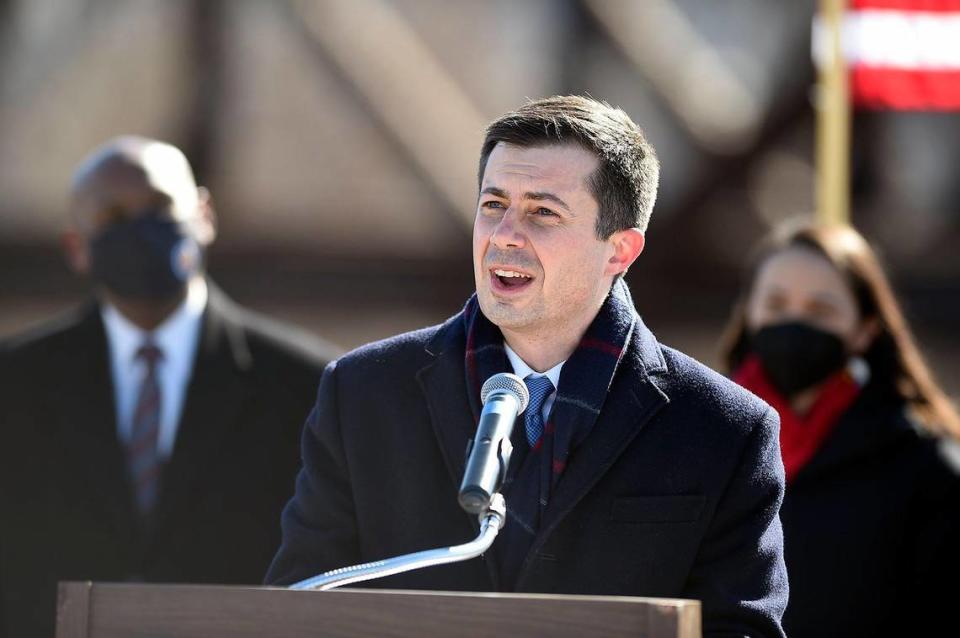Pete Buttigieg attacks Kris Kobach for calling benefits of lead pipe rules ‘speculative’
- Oops!Something went wrong.Please try again later.
- Oops!Something went wrong.Please try again later.
- Oops!Something went wrong.Please try again later.
U.S. Secretary of Transportation Pete Buttigieg and other Democrats attacked Kansas Attorney General Kris Kobach after he suggested the benefits of federal regulations on lead pipes were “speculative.”
The Republican state attorney general on Thursday night criticized a line in President Joe Biden’s State of the Union address touting the removal of lead pipes across the country as a victory.
“Biden wants to replace lead pipes. He failed to mention that the unfunded mandate sets an almost impossible timeline, will cost billions, infringe on the rights of the States and their residents – all for benefits that may be entirely speculative,” Kobach said in a post to X, the social media site formerly known as Twitter.
Kobach linked to a letter he and 14 other state attorneys general sent the Biden administration last month objecting to proposed Environmental Protection Agency rules requiring more aggressive removal of lead pipes than was previously mandated. The letter says the new rules leave the brunt of the removal cost on homeowners and municipalities.
Existing rules, which allow for the monitoring of lead levels in water and removal only when a certain threshold is reached, are more reasonable, the state attorneys general wrote.
Buttigieg, one of Biden’s top deputies, criticized Kobach on Friday after Kansas Democrats had already begun attacking him over the post.
“The benefit of *not being lead poisoned* is not speculative. It is enormous,” Buttigieg said in an X post that linked to Kobach’s.
“And because lead poisoning leads to irreversible cognitive harm, massive economic loss, and even higher crime rates, this work represents one of the best returns on public investment ever observed.”
But Kobach responded that Buttigieg had failed to understand his point.
“What’s speculative is that the admin’s EPA rule will have ANY EFFECT AT ALL on lead in tap water,” Kobach said in a subsequent post. “It doesn’t touch the pipes in buildings where most lead pipes are. You’d know that had you bothered to click the link.”
Kobach also called the proposed EPA rule an example of “unnecessary overreach” by the administration.

The EPA proposed rule requires replacement of every lead pipe in public water service lines within 10 years. Use of lead pipes was banned in the 1980s but, according to the EPA, more than 9 million lead service lines remain in use across the country. The bipartisan infrastructure law enacted in 2022 included $15 million for the removal of the pipes.
According to the Centers for Disease Control and Prevention, lead exposure can cause permanent brain damage in children stunting their development and resulting in lower intelligence and academic achievement.
U.S. Rep. Sharice Davids, a Democrat who represents much of the Kansas side of the Kansas City metro area, has spent the past several years touting projects in Kansas that helped replace lead pipes. One challenge, Davids has said, is that officials are still trying to figure out which pipes might be contaminated.
“No amount of lead exposure is safe, and we have a responsibility to ensure that every Kansan has access to safe and clean drinking water,” Davids said in a statement on Friday. “Thanks to the bipartisan infrastructure law, we’re making that a reality and I’m proud to work with local officials to protect our most vulnerable.”
Kobach’s letter focused on the EPA rule’s potential to require individual homeowners to replace lead pipes that connected to their home and insufficient funding for the removal. It suggested the rules would have limited effect because they wouldn’t impact lead pipes in internal plumbing for homes.
“Ultimately, this proposed rule is unworkable, underfunded, and unnecessary,” the letter said.
The Star’s Daniel Desrochers contributed to this report.

